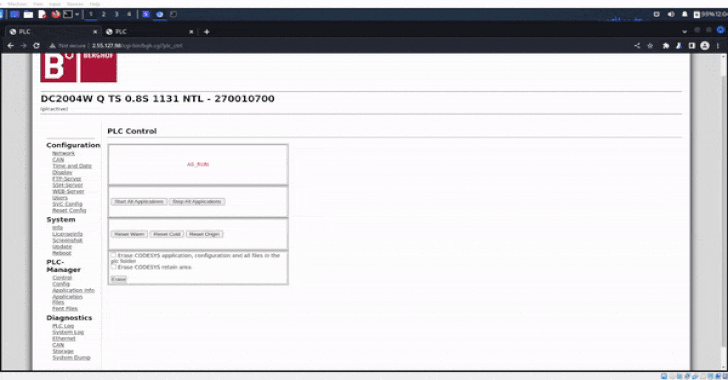
A hacktivist collective called GhostSec has claimed credit for compromising as many as 55 Berghof programmable logic controllers (PLCs) used by Israeli organizations as part of a “Free Palestine” campaign.
Industrial cybersecurity firm OTORIO, which dug deeper into the incident, said the breach was made possible owing to the fact that the PLCs were accessible through the Internet and were secured by trivially guessable credentials.
Details of the compromise first came to light on September 4 after GhostSec shared a video on its Telegram channel demonstrating a successful login to the PLC’s admin panel, in addition to dumping data from the hacked controllers.
The Israeli company said the system dumps and screenshots were exported directly from the admin panel following unauthorized access to the controllers through their public IP addresses.
GhostSec (aka Ghost Security), first identified in 2015, is a self-proclaimed vigilante group that was initially formed to target ISIS websites that preach Islamic extremism.
Earlier this February, the group rallied its support for Ukraine in the immediate aftermath of Russia’s military invasion of the country. Since late June, it has also participated in a campaign targeting Israeli organizations and enterprises.
“The group pivoted from their regular operations and started to target multiple Israeli companies, presumably gaining access to various IoT interfaces and ICS/SCADA systems, which led to possible disruptions,” Cyberint noted on July 14.
The attacks against Israeli targets, dubbed “#OpIsrael,” is said to have commenced on June 28, 2022, citing “continuous attacks from Israel towards Palestinians.”
In the intervening period, GhostSec has carried out a number of attacks, including those aimed at internet-exposed interfaces belonging to Bezeq International and an ELNet power meter located at the Scientific Industries Center (Matam).
The breach of Berghof PLCs, viewed in that light, is part of the actor’s broader shift to strike the SCADA/ICS domain, although it appears to be a case wherein the group took advantage of “easily overlooked misconfigurations of industrial systems” to carry out the attacks.
“Despite the low impact of this incident, this is a great example where a cyber attack could have easily been avoided by simple, proper configuration,” the researchers said.
“Disabling the public exposure of assets to the Internet, and maintaining a good password policy, especially changing the default login credentials, would cause the hacktivists’ breach attempt to fail.”
GhostSec, in the meanwhile, has continued to post more screenshots, claiming to have gained access to another control panel that can be used to alter chlorine and pH levels in the water.
“Hope you all can understand our decision on not attacking their pH levels and risking a chance to harm the innocents of #Israel,” the group said in a tweet posted over the weekend. “Our ‘war’ has always been FOR the people not against them. #FreePalestine”







